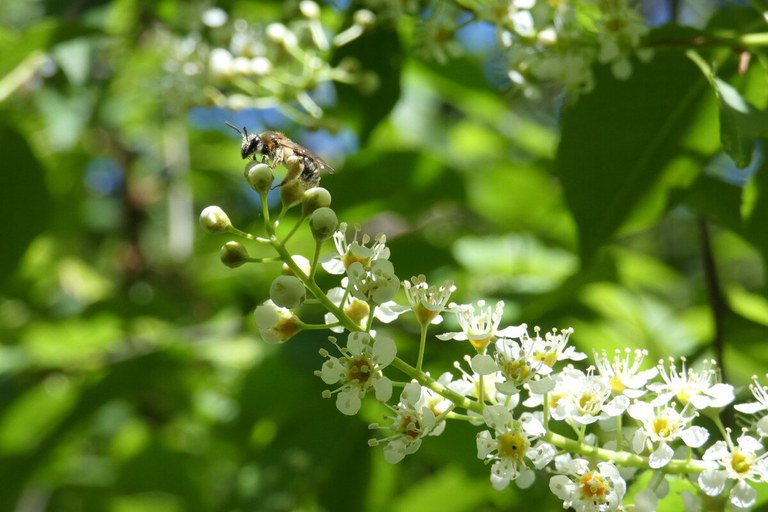Improving pollinator habitats can help to rebuild valuable hardwood species.
Problem
How can we better promote the growth and sustainability of premier commercial hardwoods?
- Black cherry is a unique hardwood in that it requires insect pollination and is unable to produce viable seed from self-pollination.
- Pennsylvania is home to nearly 30 percent of the nation's black cherry trees, used to make high-quality wood products. Over the last 20 years, seedling densities have decreased 60 percent across the Allegheny Plateau.
Findings
Researchers conducted a two-year study in developed, semi-developed, and forested areas in Centre County, Pennsylvania, and in the Allegheny National Forest to evaluate pollinator communities visiting black cherry trees.
- The researchers found andrenid—or miner—bees represented 24 percent of all interactions with black cherry flowers and carried an average of 347 times more black cherry pollen than flies and 18 times more than halictid—or sweat—bees.
Impact
This study highlights the important role of safeguarding the habitat of miner bees, which are also important pollinators of other valuable flowering trees, including apples.
- The findings can help land managers to take steps to attract and support miner bees through practices such as thinning or clearing trees at high density from sunny, well-drained areas.
Research Credit
Team
- Rachel McLaughlin, Joseph Keller, Elizabeth Wagner, David Biddinger, Christina Grozinger, Kelli Hoover
Participating Department
Competitive Funding
- Pennsylvania Department of Agriculture Hardwoods Development Council
- Pennsylvania Department of Conservation and Natural Resources Bureau of Forestry
- USDA NIFA (National Needs Graduate Fellowship Grant Program)
Other Funding
- Wyman's of Maine
Federal and State Appropriations
- USDA NIFA McIntire-Stennis Project PEN04721, Accession #1020583
Emerging Discoveries
Published Research
Insect Visitors of Black Cherry (Prunus serotina) (Rosales: Rosaceae) and Factors Affecting Viable Seed Production.
-
McLaughlin, R., Keller, J., Wagner, E., Biddinger, D., Grozinger, C., & Hoover, K. (2022). Insect Visitors of Black Cherry (Prunus serotina) (Rosales: Rosaceae) and Factors Affecting Viable Seed Production. Environmental entomology, 51(2), 471-481. https://doi.org/10.1093/ee/nvab141
Office for Research and Graduate Education
Address
217 Agricultural Administration BuildingUniversity Park, PA 16802-2600
- Email agresearch@psu.edu
- Office 814-865-3136
Office for Research and Graduate Education
Address
217 Agricultural Administration BuildingUniversity Park, PA 16802-2600
- Email agresearch@psu.edu
- Office 814-865-3136



